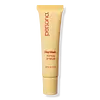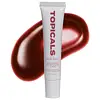What's inside
What's inside
 Key Ingredients
Key Ingredients

 Benefits
Benefits

 Concerns
Concerns

 Ingredients Side-by-side
Ingredients Side-by-side

Triisostearin
Skin ConditioningHydrogenated Polyisobutene
EmollientPolyglyceryl-2 Triisostearate
EmulsifyingEthylhexyl Palmitate
EmollientDextrin Palmitate
EmulsifyingSqualane
EmollientDextrin Palmitate/Ethylhexanoate
EmulsifyingSorbitan Isostearate
EmulsifyingDiisostearyl Malate
EmollientSimmondsia Chinensis Butter
Skin ConditioningHelianthus Annuus Seed Oil
EmollientEthylhexylglycerin
Skin ConditioningPunica Granatum Flower Extract
Skin ConditioningPolyglyceryl-3 Diisostearate
EmulsifyingTribehenin
EmollientCarthamus Tinctorius Seed Oil
MaskingRicinus Communis Seed Oil
MaskingSimmondsia Chinensis Leaf Extract
HumectantSimmondsia Chinensis Seed Oil
EmollientTocopheryl Acetate
AntioxidantSodium Hyaluronate
HumectantAroma
Hydrogenated Castor Oil
EmollientLactic Acid
BufferingPrunus Persica Fruit Extract
AbrasiveVaccinium Angustifolium Fruit Extract
Skin ProtectingPalmitoyl Tripeptide-1
Skin ConditioningTriisostearin, Hydrogenated Polyisobutene, Polyglyceryl-2 Triisostearate, Ethylhexyl Palmitate, Dextrin Palmitate, Squalane, Dextrin Palmitate/Ethylhexanoate, Sorbitan Isostearate, Diisostearyl Malate, Simmondsia Chinensis Butter, Helianthus Annuus Seed Oil, Ethylhexylglycerin, Punica Granatum Flower Extract, Polyglyceryl-3 Diisostearate, Tribehenin, Carthamus Tinctorius Seed Oil, Ricinus Communis Seed Oil, Simmondsia Chinensis Leaf Extract, Simmondsia Chinensis Seed Oil, Tocopheryl Acetate, Sodium Hyaluronate, Aroma, Hydrogenated Castor Oil, Lactic Acid, Prunus Persica Fruit Extract, Vaccinium Angustifolium Fruit Extract, Palmitoyl Tripeptide-1
Hydrogenated Polyisobutene
EmollientPolybutene
Jojoba Esters
EmollientCocos Nucifera Oil
MaskingHelianthus Annuus Seed Oil
EmollientEthylene/Propylene/Styrene Copolymer
Copernicia Cerifera Wax
Butylene/Ethylene/Styrene Copolymer
Glycerin
HumectantSodium Hyaluronate
HumectantHydrolyzed Sodium Hyaluronate
Skin ConditioningCeramide NP
Skin ConditioningCeramide AP
Skin ConditioningCeramide EOP
Skin ConditioningPhytosphingosine
Skin ConditioningPalmitoyl Tripeptide-38
Skin ConditioningCholesterol
EmollientTocopheryl Acetate
AntioxidantErgothioneine
AntioxidantStevia Rebaudiana Leaf/Stem Powder
Skin ConditioningPortulaca Pilosa Extract
Skin ConditioningSucrose Cocoate
EmulsifyingPanthenol
Skin ConditioningSodium Lauroyl Lactylate
EmulsifyingSilica
AbrasiveCarbomer
Emulsion StabilisingKaolin
AbrasiveOryza Sativa Bran Wax
Skin ConditioningXanthan Gum
EmulsifyingDimer Dilinoleyl Dimer Dilinoleate
EmollientTriisostearin
Skin ConditioningCetearyl Ethylhexanoate
EmollientOctyldodecanol
EmollientSorbitan Isostearate
EmulsifyingSorbitan Oleate
EmulsifyingWater
Skin ConditioningAroma
CI 77742
Cosmetic ColorantCI 17200
Cosmetic ColorantCI 45380
Cosmetic ColorantCI 77491
Cosmetic ColorantCI 77499
Cosmetic ColorantCI 77891
Cosmetic ColorantHydrogenated Polyisobutene, Polybutene, Jojoba Esters, Cocos Nucifera Oil, Helianthus Annuus Seed Oil, Ethylene/Propylene/Styrene Copolymer, Copernicia Cerifera Wax, Butylene/Ethylene/Styrene Copolymer, Glycerin, Sodium Hyaluronate, Hydrolyzed Sodium Hyaluronate, Ceramide NP, Ceramide AP, Ceramide EOP, Phytosphingosine, Palmitoyl Tripeptide-38, Cholesterol, Tocopheryl Acetate, Ergothioneine, Stevia Rebaudiana Leaf/Stem Powder, Portulaca Pilosa Extract, Sucrose Cocoate, Panthenol, Sodium Lauroyl Lactylate, Silica, Carbomer, Kaolin, Oryza Sativa Bran Wax, Xanthan Gum, Dimer Dilinoleyl Dimer Dilinoleate, Triisostearin, Cetearyl Ethylhexanoate, Octyldodecanol, Sorbitan Isostearate, Sorbitan Oleate, Water, Aroma, CI 77742, CI 17200, CI 45380, CI 77491, CI 77499, CI 77891
 Reviews
Reviews

Ingredients Explained
These ingredients are found in both products.
Ingredients higher up in an ingredient list are typically present in a larger amount.
Aroma refers to an ingredient, or mixture of ingredients, that impart or mask a flavor.
The name is slightly confusing. This is because INCI associates aroma with flavor instead of smell.
Here is the official definition from the The International Cosmetic Ingredient Dictionary and Handbook:
“Aroma is a term for ingredient labeling used to identify that a product contains a material or combination of materials normally added to a cosmetic to produce or to mask a particular flavor.”
INCI shows the only purpose of aroma to be "flavouring".
However, due to regulation differences, some companies may use aroma in place of parfum.
In Canada, this ingredient only has to be listed in concentrations above 1%.
Learn more about AromaHelianthus Annuus Seed Oil is the oil derived from the seeds of a Sunflower. Sunflower seed oil is non-fragrant. It is an emollient, meaning it helps to soften the skin.
Sunflower seed oil contains many fatty acids. The fatty acids found in sunflower seeds include (from highest amount to least): linoleic acid, myristic acid, palmitic acid, stearic acid, arachidic acid, oleic acid, and linolenic acid.
These fatty acids help the skin create ceramides. Ceramides play a role in repairing the skin barrier.
Helianthus Annuus Seed Oil helps moisturize the skin. This in turn helps the skin look more rejuvenated and smoother.
Sunflowers are rich in vitamin E.
Historians believe Indigenous cultures of North America domesticated sunflowers before corn. Thus they relied on sunflower oil for a variety of uses. One such use is moisturizing skin and hair.
Sunflower seed oil may not be fungal acne safe. We recommend speaking with a professional if you have any concerns.
Learn more about Helianthus Annuus Seed OilHydrogenated Polyisobutene is a synthetic polymer. Polymers are compounds with high molecular weight. Hydrogenated Polyisobutene is an emollient and texture enhancer.
In one study, Hydrogenated Polyisobutene showed better skin hydration levels than Caprylic/Capric Triglyceride. As an emollient, it helps keep your skin soft and hydrated by trapping moisture in.
Hydrogenated Polyisobutene is often used as a mineral oil replacement.
Learn more about Hydrogenated PolyisobuteneSodium Hyaluronate is hyaluronic acid's salt form. It is commonly derived from the sodium salt of hyaluronic acid.
Like hyaluronic acid, it is great at holding water and acts as a humectant. This makes it a great skin hydrating ingredient.
Sodium Hyaluronate is naturally occurring in our bodies and is mostly found in eye fluid and joints.
These are some other common types of Hyaluronic Acid:
Learn more about Sodium HyaluronateSorbitan Isostearate is an emulsifer and cleaning agent. It is created from isostearic acid and sorbitol.
As an emulsifier, Sorbitan Isostearate prevents oils and water from separating.
Due to its isostearic acid base, it may not be safe for Malassezia or fungal acne.
Learn more about Sorbitan IsostearateTocopheryl Acetate is AKA Vitamin E. It is an antioxidant and protects your skin from free radicals. Free radicals damage the skin by breaking down collagen.
One study found using Tocopheryl Acetate with Vitamin C decreased the number of sunburned cells.
Tocopheryl Acetate is commonly found in both skincare and dietary supplements.
Learn more about Tocopheryl AcetateTriisostearin isn't fungal acne safe.